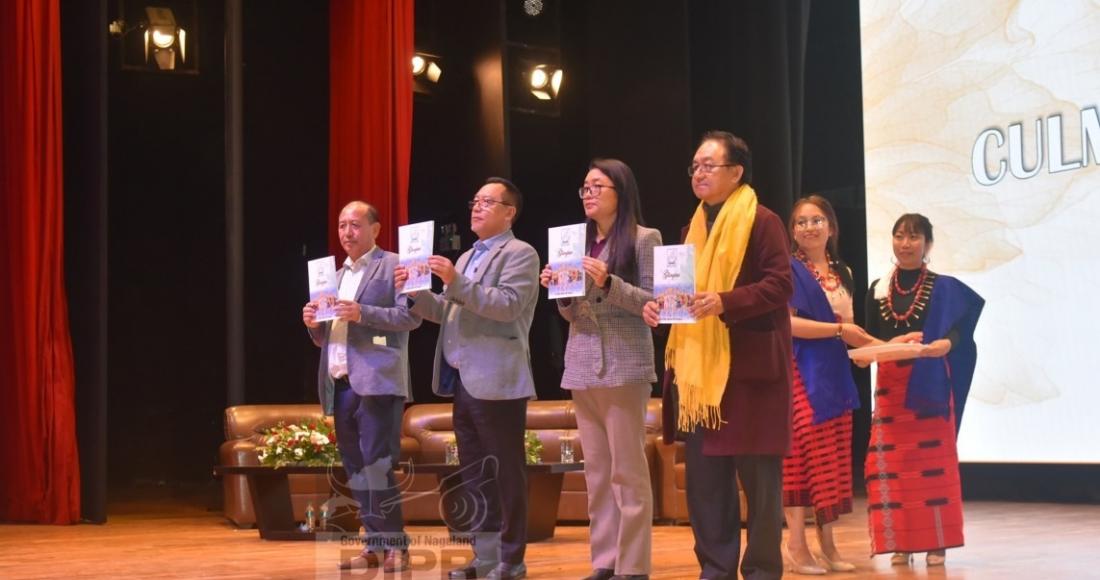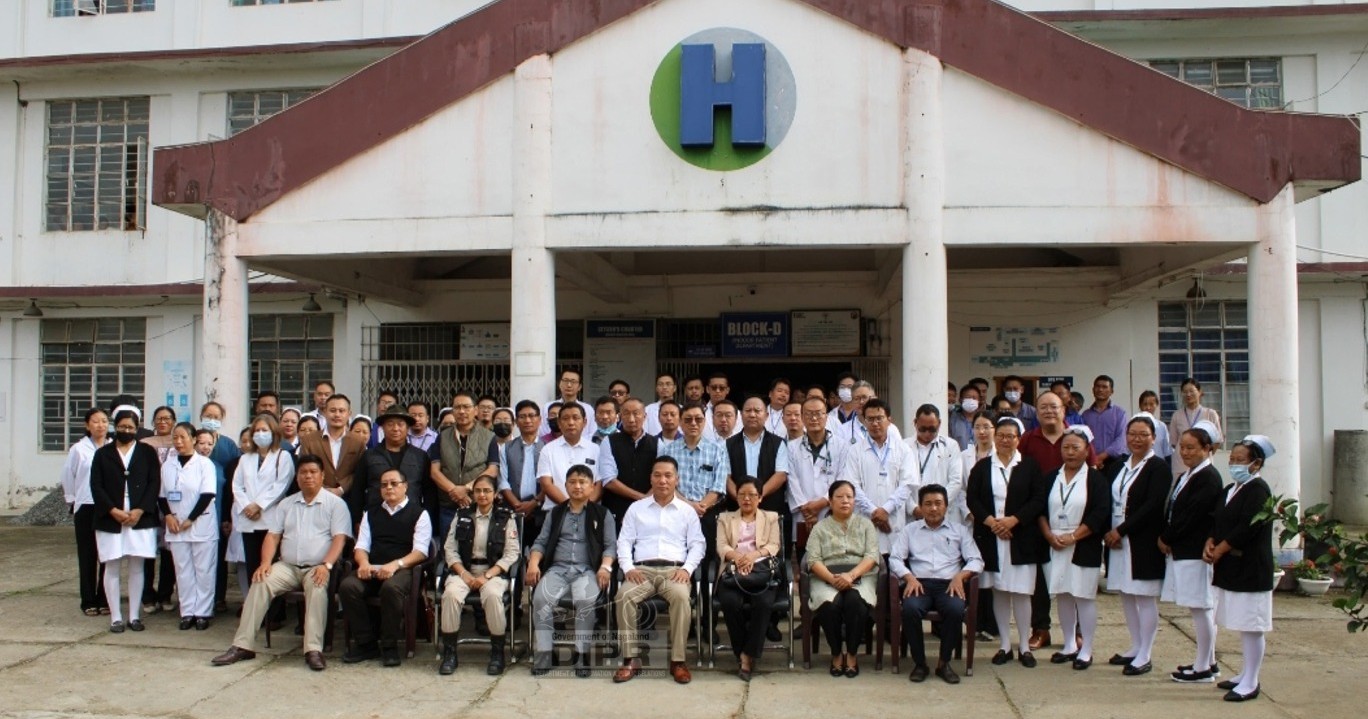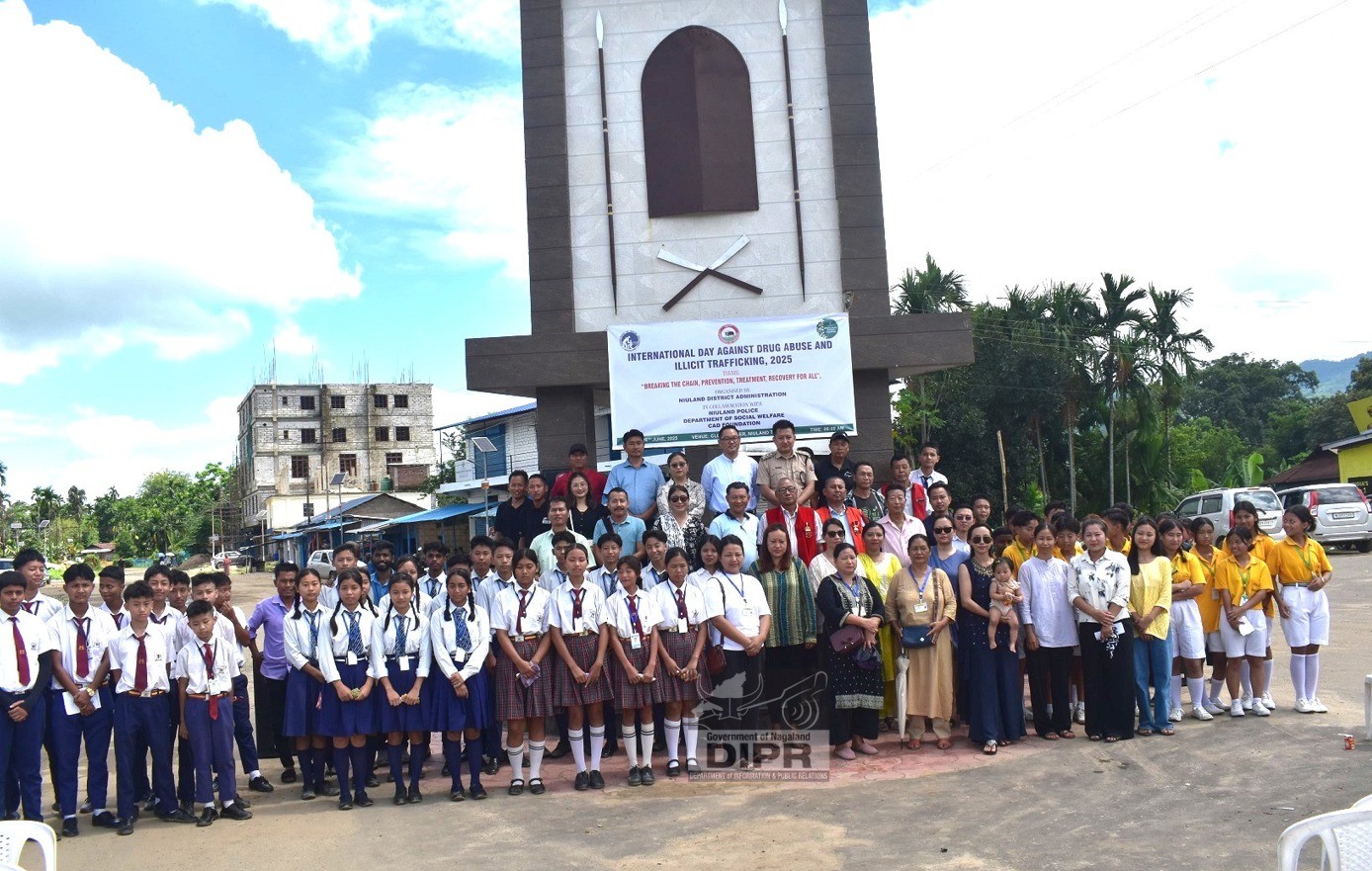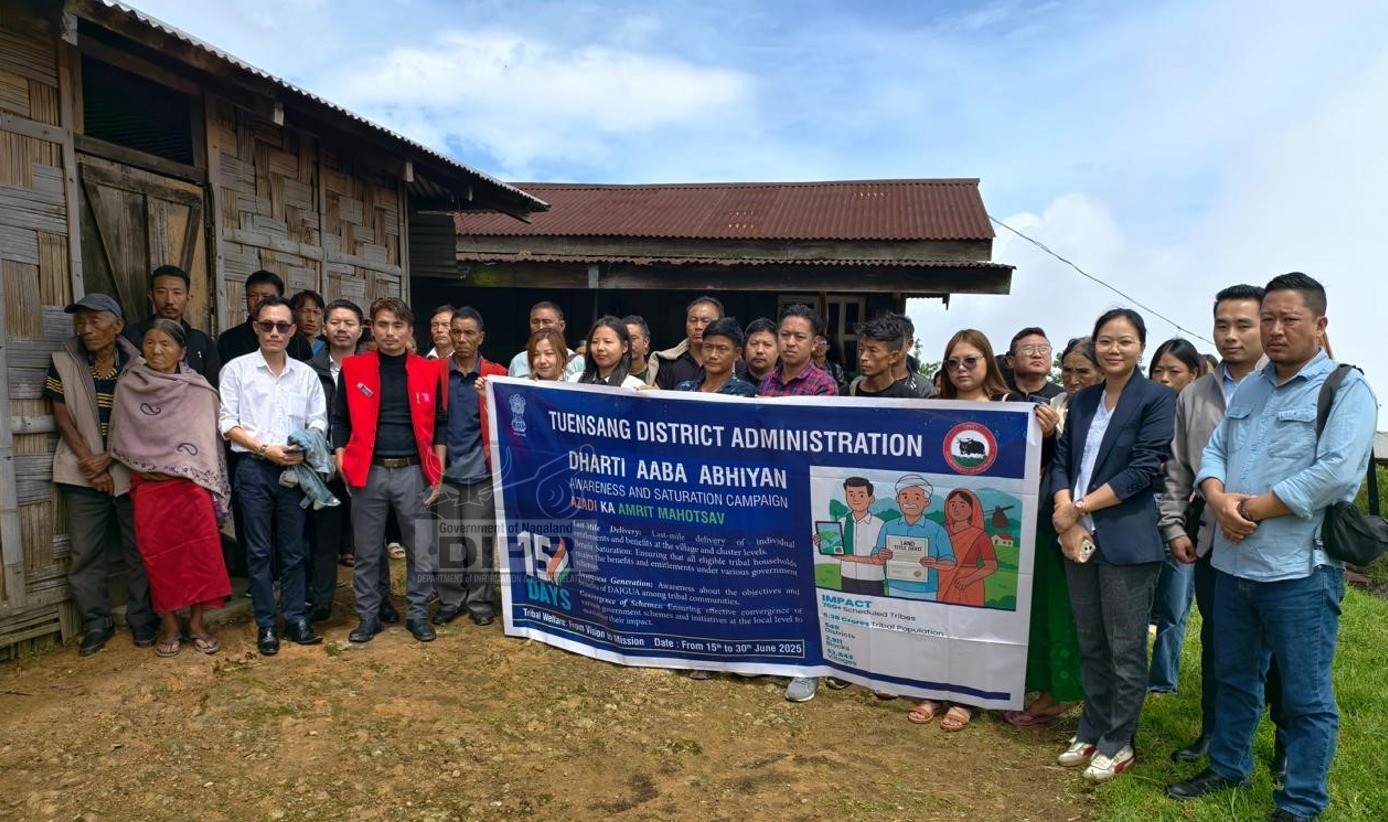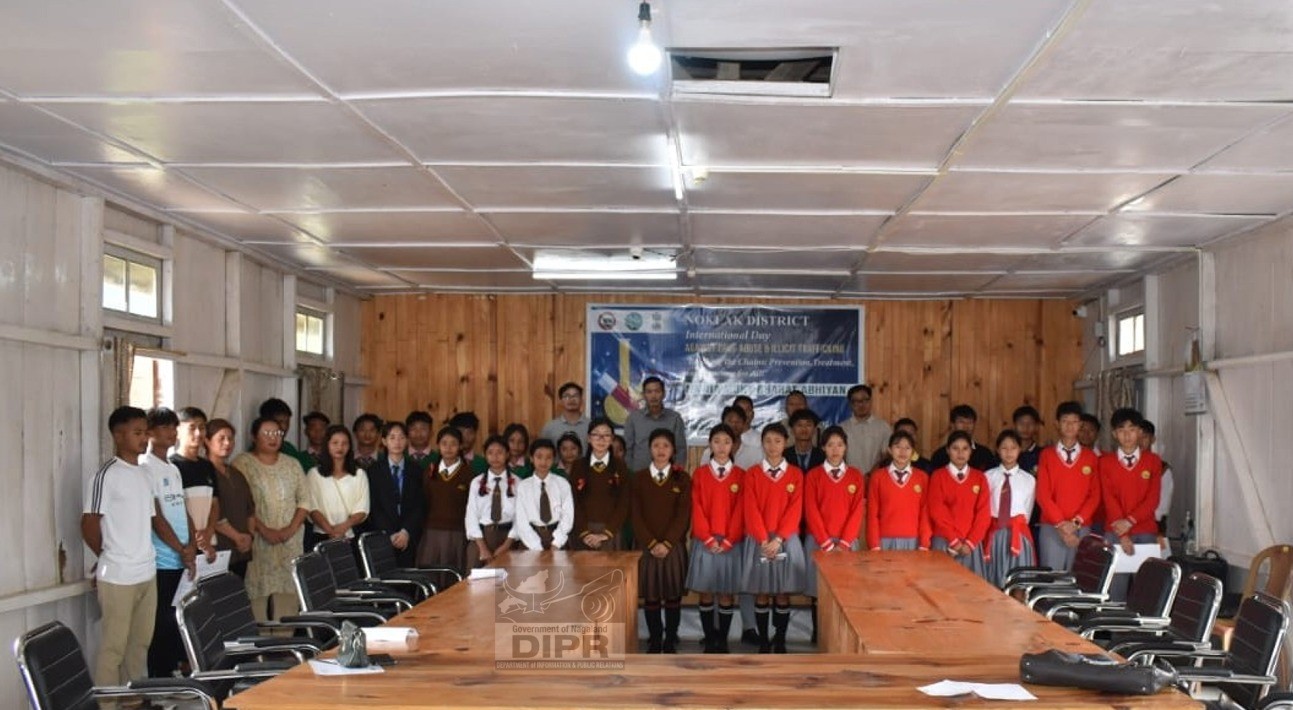The culmination programme of Nagaland Health Project (NHP) (A World Bank Aided Project) was held at the Capital Cultural Centre, Kohima on 24th November 2022, with Minister, Health & Family Welfare, S. Pangnyu Phom as the special guest. NHP which has two components, namely Component 1 (Community action for health and nutrition) and Component 2 (Health system development), with support from World Bank, aims to improve the management and delivery of health services and increase their utilization by communities in targeted localities in Nagaland without duplicating existing government programmes.
Addressing the gathering, Minister Pangnyu Phom said that Nagaland Health Project is the first state level project funded by the World Bank, with its focus on selected sites such as District Hospitals, Community Health Centres, Primary Health Centres, Sub-Centres and its catchment villages. He said that High volume ground level storage tank was projected to be constructed to store water from roof water harvesting and elevated water tanks to be used to store and supply running water to the health facilities through pipe line has been constructed in 175 health facilities. Civil repair and renovation works have been completed in 4 Nursing Schools and PMTI, 9 District Hospitals, 158 targeted health facilities, also, repair and renovation works in 2 District Hospitals, construction of Library and Theatre Block in Nagaland Medical College is in progress, he added.
Minister Pangnyu stated that since its inception, Nagaland Health Project (NHP) has successfully signed 133 contracts, of which only 16 remains active and the rest 117 contracts are completed. As of today, NHP on average, has achieved 95% physical and 82% financial progress. He added that even during COVID-19 pandemic, NHP constructed oxygen generation plants house at 8 District Hospitals and installed oxygen pipelines at various health facilities.
Retired Principal Director & Former Project Director, Nagaland Health Project, Dr. Nandira Changkija narrated about the difficulties faced in the early years of the health sector in the State, and how NHP concept was started. She credited the World Bank team, State Government, bureaucrats involved in bringing about the project in spite of so many hurdles faced. With the project extended up to 2023, she said it is the responsibility of the community for the success of the project. She expressed hope that the project will cover all the recognized villages, with 700 villages being covered at present. She also requested the authorities to use the funds judiciously.
Senior Health Economist, World Bank, Marion Jane Cros highlighted the role of the community, stating that it is the key driver which has really helped shape the health system of Nagaland. She also lauded the State for implementing the project through Result Based Financing, which she stated is not easy to implement. She further added that the NHP has been able to help in system strengthening which she hoped will continue further through the lessons learnt. To further institutionalize the project, she pointed out the need for funding, and requested the government to address the issue of financial assistance so that the community will be able to continue the good work.
Secretary and Chairman, Project Executive Committee, Asangla Imti said that as with every development stories, there are lessons to learn, to improve upon, and how these interventions needs to be carried forward in the future. She pointed out that firstly, at the district level, quarterly reviews were not conducted regularly, and this needs to be taken seriously; secondly, record keeping, proper documentation and timely reporting is not up to mark, this needs to be practiced with sincerity as this is an important input for policy makers to plan and frame policies; thirdly, Project Grievance Redressal Mechanism needs to be addressed as it is important to monitor and address problems on the spot; fourthly, the Village Committee at the grassroot need to figure out how to improve the health system, need to plan properly so as to spend the funds judiciously. This requires the collective efforts of the stakeholders including the District Officers. Communitization needs to be practiced and implemented. She said that it is responsibility and obligation of all to work hand in hand, and to improve the health delivery system in the State.
Sharing the journey of Nagaland Health Project (NHP), Deputy Director, NPH, Dr. Thomas Keppen said that NHP was started in 2015, earlier, it started off as Nagaland Multi Centre Health Project. In 2015, under Component - I, it was started in 19 Health Communities in Jalukie Block (Peren) and 13 Health Communities in Noklak (Tuensang) as pilot sites. When it first started, the project faced challenges such as difficulty in information dissemination, coordination within the department and among the departments, resistance from the committiees etc. It was officially launched on 1st June 2017, and was designed in such a way that it would strengthen the community and benefit all. Initially
Imnasenla Shanbur Jamir, Consultant, World Bank, sharing on the Learning & Sustainability Plan of Nagaland Health Project, stated that in order to ensure that the changes and infrastructure improvements are sustained, it is imperative that all these changes are adopted at the State level as well, and added that with the help of a monitoring committee, the department and health facilities at all levels, it must actively play a pivotal role in ensuring that the asset created are utilized effectively and maintained properly. She stated that sustaining critical activities such as biomedical waste management created through the project is crucial and that the department must set up a Waste Management Committee which can organize periodic trainings for health workers and public on waste management and segregation and disposal, and said that the immediate next goal should be in setting up a Nagaland Waste Treatment Plant. She pointed out on how sustainable practices of rainwater harvesting, use of solar power in hospitals can ensure that these systems continue to work and improve over the course of years to come.
During the programme, experiences were shared by representatives from Village Health Committee, Health Sub Centre Management Committee, Health Centre Management Committee, Hospital Management Committee, District Health Society, and District Programme Management Unit. Minister Pangnyu also awarded Certificates and cash award to the Best Performing Committees (3 Centres - CHC/PHC/VHC/Sub-Centres from each district in all the 11 districts, excluding the newly created districts of Noklak, Tseminyu, Niuland, Chumukedima and Shamator).
The invocation was pronounced by Rev. Tiatoshi Longkumer, Pastor, Kohima Ao Baptist Arogo, and the welcome address was delivered by Principal Director, Health & Family Welfare, Dr. K. Vikato Kinimi. Closing remarks and vote of thanks were delivered by Additional Project Director, NHP, Dr. Lhouvizotuo Belho.
(Mhonlumi APRO & Nouneseno, IA)


